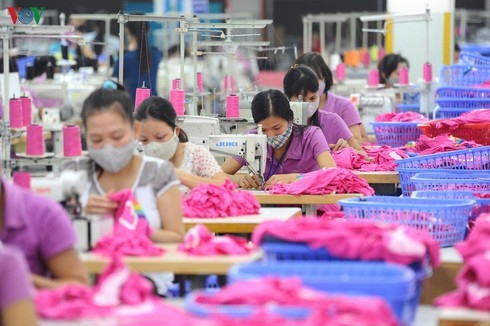Local businesses continue to suffer negative impact of COVID-19
VOV.VN - The ongoing complicated developments relating to the COVID-19 pandemic both globally and domestically are causing an array of difficulties for the local business community.
Many economic experts believe this year will represent a huge challenge for firms and will require local businesses to quickly innovate in order to adapt to the realities of a new situation.
Truong Van Cam, vice chairman and General Secretary of the Vietnam Textile and Apparel Association, states that both the first quarter and second quarter of the year saw the textile and garment industry record a negative growth rate of 2% and 16.67%, respectively. Indeed, these figures can be put down to the significant impact of the COVID-19 pandemic, adding that the figures moving forward remain unknown.
Furthermore, several experts feel that the third quarter of the year will likely be the time that labour-intensive industries such as the textile and apparel sector will suffer greatly from the true impact of the COVID-19, thereby being a huge challenge for them.
Alongside the manufacturing industry in using a large labour force, the leather and footwear industry since the beginning of the year has had to "struggle" to maintain its operations. Due to difficulties with capital, output for products is still proving to be a burden for many businesses.
Phan Thi Thanh Xuan, vice president and General Secretary of the Vietnam Leather - Footwear - Handbag Association, says major enterprises have also seen their orders reduced by 50%. As a result, many big enterprises have cut 30% of their labour force, with some even laying off 70% of their employees.
“One of the other difficulties faced by the footwear industry is the capital issue. Footwear businesses have made policy recommendations, but have yet to be able to receive support from the Government. If the pandemic can be brought under control between now and October, businesses will be able to hold out and overcome it. But no one knows when the pandemic will be over. Therefore, both enterprises and the State should outline a response scenario,” Xuan says.
The impact of the COVID-19 epidemic has led to firms switching strategic policies in an unprecedented manner, according to economic experts, as some costs that were once considered fixed by business leaders are now being viewed as variable costs.
Moreover, capital capacity is rapidly being seen as creating a difference as it has now become a necessary condition for operating businesses. Simultaneously, enterprises must continue to balance strategies, cut costs without affecting their production and business activities, in addition to promoting investment shift towards growth factors in order to be fully prepared for future crises.
Ass. Prof. Dr. To Trung Thanh, an economic expert from the National Economics University, describes the COVID-19 pandemic as an opportunity for the country to re-examine mechanisms and institutions relating to the economy and view them with radical longer-term solutions in mind.
It can therefore be viewed as necessary to reshape production, business methods, and production processes, whilst also optimising value chains, and incentivising local firms to carry out a step-by-step digital transformation to ensure the dual goal of preventing and controlling the epidemic whilst also maintaining economic development, Dr. Thanh notes.

